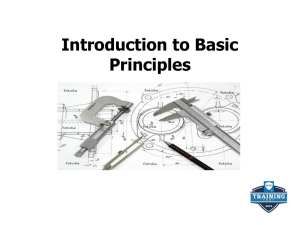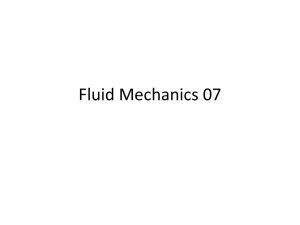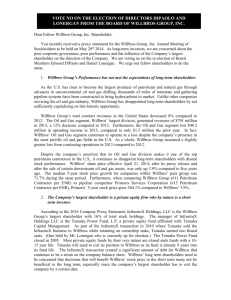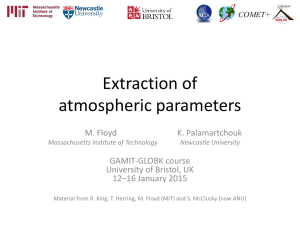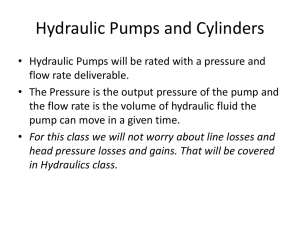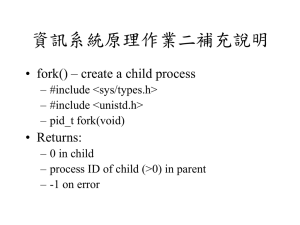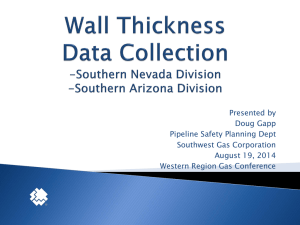willbros - Western Regional Gas Conference
advertisement
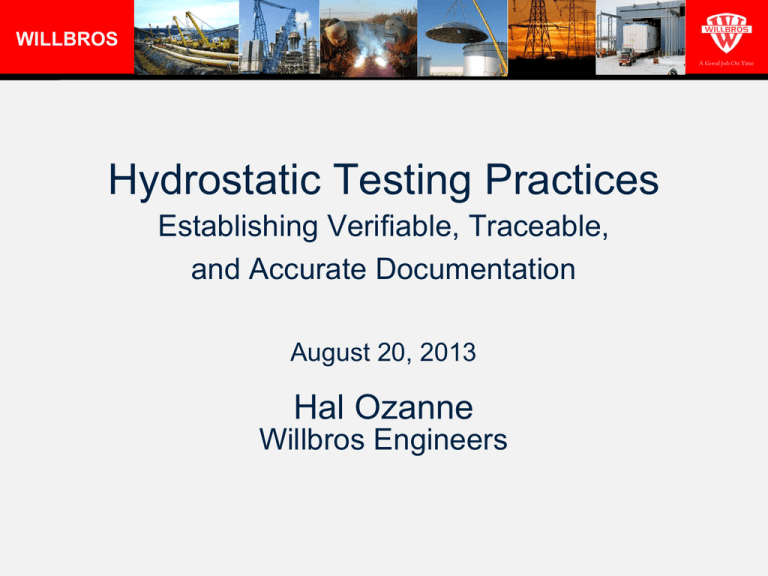
WILLBROS A Good Job On Time Hydrostatic Testing Practices Establishing Verifiable, Traceable, and Accurate Documentation August 20, 2013 Hal Ozanne Willbros Engineers Hydrostatic Testing Practices • Verifiable, Traceable, Accurate Documentation • Hydrostatic Testing Calculations Hydrostatic Test Plans Hydrostatic Test Reports Data Collection and Final Verification Pipeline and Hazardous Materials Safety Administration (PHMSA) Audits Record Keeping Approvals/Signatures 2 WILLBROS Hydrostatic Testing Practices • Hydrostatic Testing Calculations Detailed calculations based on pipe characteristics and specifications – OD, wt, grade, weld/seam type, length of segment – Flange or no flanges (ANSI rating could be limiting factor for pressure) – Based on 100% SMYS or 125% MAOP – Surveyed pipe elevations – Test medium, volume, and temperature constraints Segment lengths based on elevations and SMYS requirements Project Management Review and Approval – Engineering Project Manager – Client Project Manager 3 WILLBROS Hydrostatic Testing Practices • Hydrostatic Testing Calculations MAOP Verification calculated and determined by final hydro test results TEST SEGMENT 1 PIPE UNITS Pipe OD (in) 12.75 IN Pipe WT (in) 0.25 IN Pipe Grade 60,000 PSI MAOP (psig) 1,440 PSIG Segment Legnth (ft) 100,000 FT Design Factor 0.72 Determined by Class Location Required Testing Factor 1.25 Based on design factor for the Class Location SMYS Pressure 2,353 PSIG DETERMINE WHICH MINIMUM TEST PRESSURE BELOW WILL BE USED AT HIGH POINT OF TEST SEGMENT Minimum Test Pressure 1,800 Per code based on required testing factor and MAOP Minimum Test Pressure 2,118 = 90% SMYS Selected Min Test Pres. 2,118 PSIG DETERMINE WHICH MAXIMUM TEST PRESSURE BELOW WILL BE USED AT LOW POINT OF TEST SEGMENT Maximum Test Pressure 2,160 Test Factor of 1.5 based on 1.25 min test pressure above Maximum Test Pressure 2,353 = 100% SMYS Selected Max Test Pres. 2,353 PSIG Test Segment Volume 612,211 GAL 14,576 BBL CHECK NOTES BELOW REGARDING DEAD WEIGHT PRESSURES COMPARED TO TEST PRESSURES Dead Weight Pres. Min 2,118 PSIG Dead Weight Pres. Max 2,353 PSIG Dead Weight Elevation 5,902 FT TEST PSIG % SMYS Begin Point Elevation, FT 5,902 0+00 Calculated Min Test Pressure 2,247 95.5% Test pressure is within range of minimum and maximum test pressure Begin Point Elevation, FT 5,902 0+00 Calculated Max Test Pressure 2,219 94.3% Test pressure is within range of minimum and maximum test pressure N/A Low Point Elevation, FT 5,594 1107+35 Calculated Min Test Pressure 2,381 101.2% TEST PRESSURE OUT OF ACCEPTABLE RANGE - CHECK SEGMENT 1,714 Low Point Elevation, FT 5,594 1107+35 Calculated Max Test Pressure 2,353 100.0% Test pressure is within range of minimum and maximum test pressure N/A High Point Elevation, FT 6,201 590+86 Calculated Min Test Pressure 2,118 90.0% Test pressure is within range of minimum and maximum test pressure 1,525 High Point Elevation, FT 6,201 590+86 Calculated Max Test Pressure 2,090 88.8% TEST PRESSURE OUT OF ACCEPTABLE RANGE - CHECK SEGMENT N/A End Point Elevation, FT 5,650 1278+29 Calculated Min Test Pressure 2,357 100.2% Test pressure is within range of minimum and maximum test pressure 1,697 End Point Elevation, FT 5,650 1278+29 Calculated Max Test Pressure 2,329 99.0% Test pressure is within range of minimum and maximum test pressure N/A STATION # Elevation Change Note 1: Note 2: Note 3: WILLBROS CALCULATED MAOP 1,618 607 FT If the test pressure calcualted at any point along the test segment is less than the minimum test pressure, then the minimum dead weight pressure required will need to be increased, provided it does not exceed the maximum test pressure. If the test pressure calculated at any point along the test segment is greater that the maximum test pressure, then the maximum dead weight pressure required will need to be lowered provided that the new lower maximum test pressure is not below the minimum required test pressure. If the minimum and maximum dead weight test pressure range cannot be adjsuted within the test segment to keep the test pressure within the range of the minimum and maxiumum test pressure, the the test segment will need to be broken into smaller segments. 4 Hydrostatic Testing Practices • Hydrostatic Test Plan Set it up right and make it fully complete with Environmental Input – To comply with permits, environmental needs to be involved to ensure compliance (BLM, Corps of Engineers, FERC, NEPA, etc) – Advise on supply sources and discharge areas Fabrication Test (4hr) or Mainline Test (8 hr) – Fabrication Test for HDDs and long bores prior to installation – Mainline Test for mainline (including HDDs) once in ground 5 WILLBROS Hydrostatic Testing Practices • Hydrostatic Test Plan Environmental Requirements and Stipulations – Water Source – Discharge Location – Water Quality Detailed to describe all parts of Hydro Test – Filling and pressuring up – Performing Test – Gathering Data – Completion of test – Dewatering of segment – Move water from one segment to the next or new water each segment – Drying and Cleaning – Final Verification and sign off 6 WILLBROS Hydrostatic Testing Practices • Hydrostatic Test Plan Max and min test pressures for each Segment – Provide location of expected occurrence in plan – Provide expected test site location pressure DOT/PHMSA Requirements (also use API RP1110) – Depends on type of test (spike test, strength test, leak test) – Pressure test medium, equipment, and materials – Qualifications of contractor and personnel performing test – Test period, failures, leaks – Test records and drawings kept for useful life of pipeline – Approval Signatures (operator of test, witness of test, personnel certifying the test) 7 WILLBROS Hydrostatic Testing Practices • Hydrostatic Test Plan Acceptance Criteria established prior to conducting test Proper Approvals and Signatures – Project Engineer – Project Manager – Construction Manager – Client Project Manager 8 WILLBROS Hydrostatic Testing Practices • Hydrostatic Test Report Set it up in the beginning so that all data required to be gathered is understood by test operators Based on Operating Company Standards and DOT/PHMSA Requirements (also API RP 1110) Attention to Detail 9 WILLBROS Hydrostatic Testing Practices • Hydrostatic Test Report Proper Recording of Measurements – Pipe Diameter and wall thicknesses – Pipe Grade and SMYS and/or ANSI rating – Location and elevation – Test Medium description, source, and volumes – Any additives description and volumes – Date and time of start and stops – Pressure vs. Time log – Temperature (ambient and pipe or test medium) – Weather conditions – Segment length 10 WILLBROS Hydrostatic Testing Practices • Hydrostatic Test Report Completeness of Forms and Records Proper Approvals and Signatures – Test Operator – Operator Supervisor – Construction Manager – Project Engineer – Client Authorized Representative (can be construction manager or project engineer in many cases) 11 WILLBROS Hydrostatic Testing Practices • Hydrostatic Test Data Collection Planning and Preparation Understanding Test Report and Forms – Anyone involved in the test or reviewing/approving of the test data – Allows those involved to know exactly what is required to be gathered and what is required to be approved based on what is provided Maintain and Include Raw Data Gathered into Final Test Report Book 12 WILLBROS Hydrostatic Testing Practices • Hydrostatic Test Data Collection Calibration of Instruments and Equipment – High volume pump and associated piping and meter for line fill – Injection pump for corrosion inhibitors, leak detection dyes or gases, or other chemicals – Variable speed PD pump for pressurization with known volume per stroke and a stroke counter – Pressure sensing device and deadweight tester – Continuous pressure recording device – Test medium temperature sensing device and display – Ambient temperature sensing device and display – Continuous temperature recording device for test medium and ambient – Test medium sampling equipment – Gas/oxygen detecting equipment 13 WILLBROS Hydrostatic Testing Practices • Hydrostatic Test Data Collection Collecting/Recording All Details and Information Required on Reports and Forms – Test medium volumes, pressures, temperatures, times – Ambient pressures, temperatures, weather conditions – Pipe conditions and specifications (OD, wt, grade, high/low point, etc) – Instrument/Equipment calibration information – Failures, leaks, condition changes – Approvals Maintain and Clean up All Field Notes on Drawings and Books – Incorporate into overall Test Report Maintain All Failure Record Data for Final Book 14 WILLBROS Hydrostatic Testing Practices • Hydrostatic Test Data Collection Temperature Recorders – Weather condition changes can affect volume of test medium to maintain constant pressure on pipeline – Secure temperature bulb directly to bare pipe, insulate, and backfill to ground level 12 hr prior to test – 12 hr allows for fill medium, pipe, and ground temps to stabilize – Locate temperature bulbs on pipe a minimum of 500’ from exposed pipe 15 WILLBROS Hydrostatic Testing Practices • Hydrostatic Test Data Collection Temperature Changes – As temp increases, pressure increases – As temp decreased, pressure decreases – Temp changes can affect volume of medium in pipe – Important to not conduct test during periods of day when temperature change is significant (frost levels play important role in test temperature as well) 16 WILLBROS Hydrostatic Testing Practices • Hydrostatic Test Data Collection Test Start Date: Small Leak or Change in Temperature? Month Day, Year Test End Date: TIME O B S . P R E S S UR E T EM P . (24 Hr. Clock) (Deadweight Reading) Ambient T EM P . Month Day, Year T EM P . T EM P . Readings should be taken every 15 minutes for test R E M A R KS : (No te any additio ns/withdrawals o f test medium, start and sto p o f test, pressure reductio ns, weather changes, o r anything Exposed Pipe Buried Pipe, 1 Buried Pipe, 2 else that may affect the test. – Compare change in pipe temp to change in weather conditions – Change in pipe temp should correlate to change in ambient temp (changes show up on temperature plot for test) – Corrected volume equations at beginning and end of test account for change in pressure and temperature which correlates to change in volume – Spreadsheet set up to determine corrected volumes - part of test plan/report Test Supervisor Signature Test Operator Signature * Contractor shall provide means of volumetric changes to line prior to test. 17 WILLBROS Hydrostatic Testing Practices • Final Verification Verify that final book is complete and contains all information in one location – Hydro Test Plan and Calcs – Test specifications – Survey data – Calibration certificates – Hydro test reports – Original test charts 18 WILLBROS Hydrostatic Testing Practices • Final Verification If all required data is in one place, then it is easier to gather, maintain, and deliver to auditors Ensure that the following people have signed off on the Test Report and Data Collected – Field Person Responsible for Gathering Data – Field Supervisor Over Hydro Test – Construction Manager – Project Engineer – Project Manager – Client Project Manager 19 WILLBROS Hydrostatic Testing Practices • PHMSA Audits – Checks during construction to verify proper records being kept – Documentation is the first thing to be checked during a field audit – First impression set the tone for the audit Record Keeping – Records should have proper approvals and signatures on them – Should be same throughout duration of project – Fabrication testing (HDDs) and Mainline testing (main pipeline) Documentation Approvals/Signatures – Checks for field personnel, engineering personnel, and Company personnel signatures and approvals of test records and reports 20 WILLBROS WILLBROS A Good Job On Time www.willbros.com
